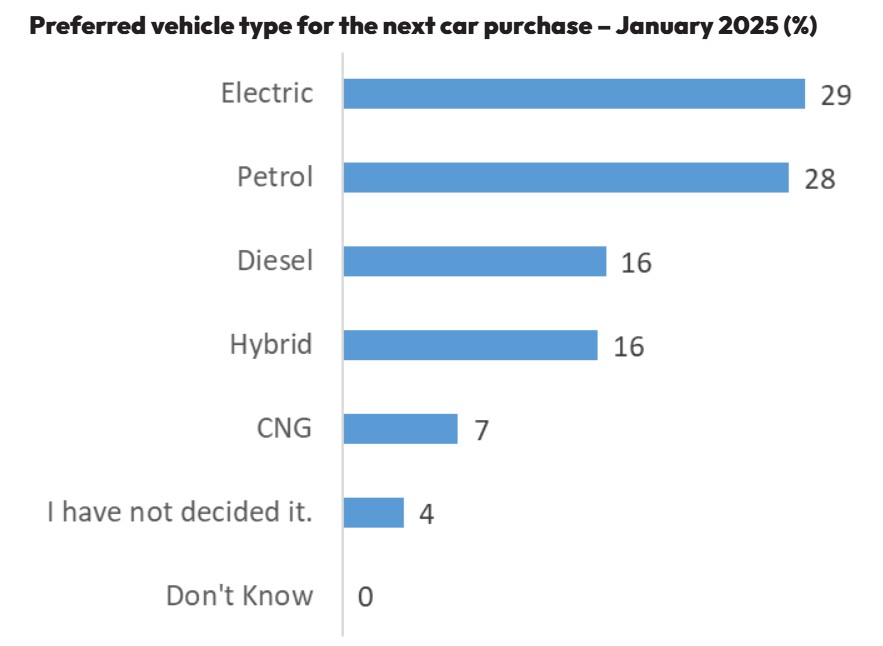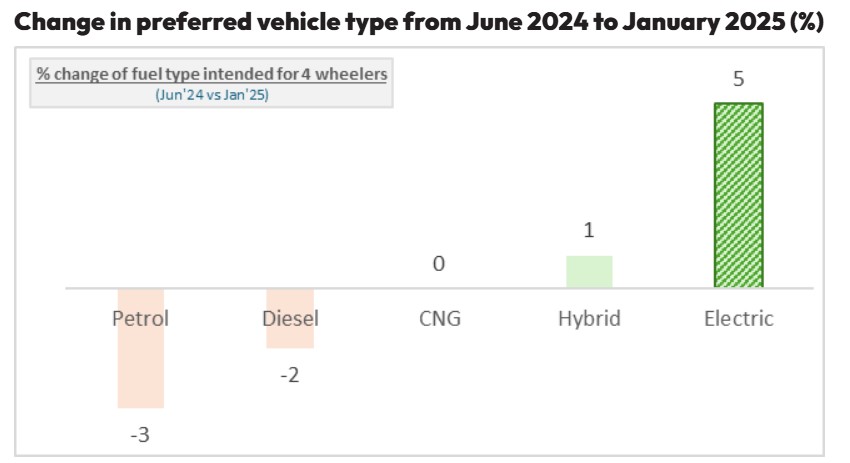The next preferred car type by Indian Consumer (Chart of the Month Feb)
- Release date: Feb 24, 2025
- 2237 Views
As the world moves toward a more sustainable future, the shift to electric vehicles (EVs) is becoming increasingly prominent. This transition was evident at the recently concluded Bharat Mobility Auto Expo 2025, which showcased the automotive industry's commitment to clean transportation.
The event brought together established players and emerging startups, all dedicated to advancing green mobility solutions.
The expo highlighted innovations in green technology, energy-efficient solutions, and intelligent transportation systems, reinforcing the industry's trajectory toward sustainability.
To better understand consumer sentiment, INTAGE INDIA conducted a survey to examine respondents' preferred vehicle type for their next car purchase.

The survey results indicate a strong preference for electric vehicles (EVs), with 29% of respondents selecting EVs as their next car. Petrol vehicles closely follow at 28%.
In addition, we conducted a trend analysis, examining consumer preferences regarding fuel types for future vehicle purchases. The study compared survey data from June 2024 and January 2025, offering valuable insights into evolving consumer choices.

Recent data from June 2024 to January 2025 highlights a rise in consumer intent to purchase electric vehicles. With growing concerns about environmental impact and fuel costs, more people are considering EVs for their next car. This shift reflects increasing awareness of cleaner transportation options and a broader move toward eco-friendly solutions.

Among the key demographics, the 18-24 age group is leading the charge in EV adoption. This generation is more environmentally conscious and inclined towards sustainable lifestyles, which is directly influencing their preference for electric vehicles. This incline is also supported by the decrease in the petrol 4-wheeler adoption.
The growing demand for electric vehicles (EVs) signals a major transformation in the automotive industry. In particular, the increasing preference for EVs among environmentally conscious younger consumers is a key factor in shaping future market trends.
However, accurately predicting the future direction of the industry is not an easy task. Trends in engine types are influenced not only by consumer preferences but also by various factors, including government policies, advancements in battery technology, and infrastructure development. Nonetheless, given that the industry as a whole is embracing cleaner, smarter, and more efficient transportation solutions, the road ahead is undeniably leading toward electrification.
At INTAGE INDIA, we will continue to closely monitor developments in the automotive industry and provide our clients with valuable insights.
[INTAGE Monthly Tracking Survey]
Area: Delhi, Mumbai and Bangalore
Target: Male and Females aged 18-44 years old
Methodology: Online Survey
Sample size: 360 (Equally distributed by area, gender, and age)
Timing of survey: Last week of each month
The original text is here
-

Author profile
Intage India
***
-

Editor profile
Chew Fong Tat
Malaysian researcher currently reside in Tokyo
 Global Market Surfer
Global Market Surfer CLP
CLP